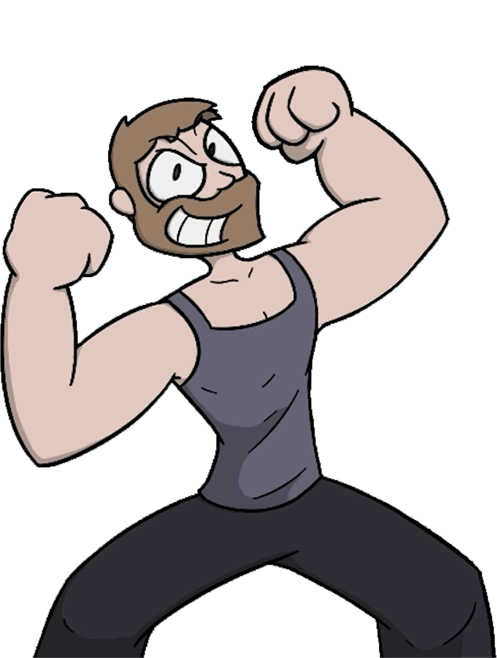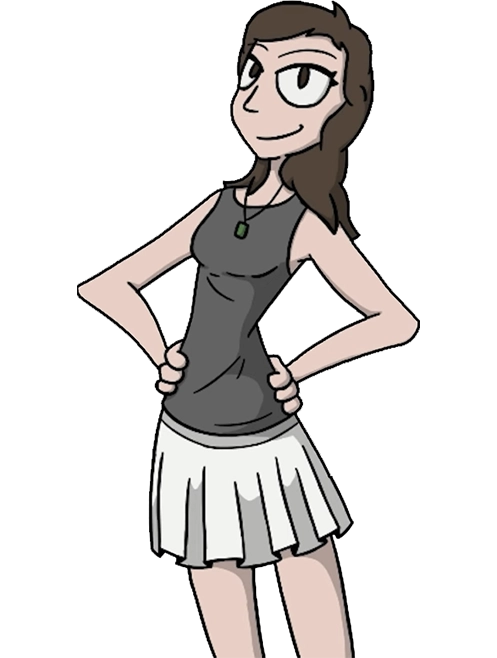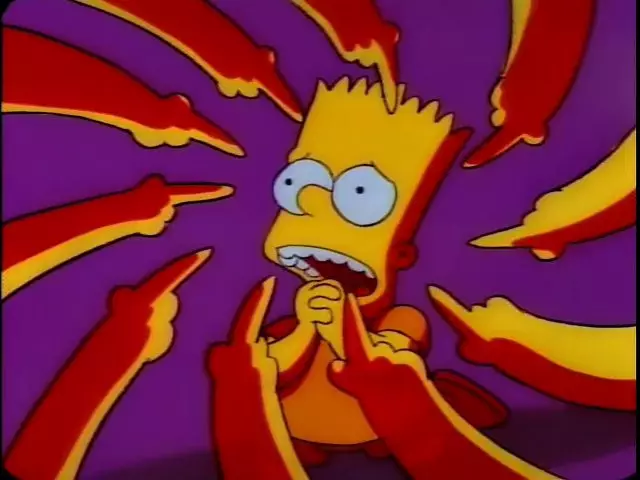My Recollection
A kind of a bummer episode. Bart ruins a holiday because he’s a prick. This hits home because I was a prick. They pay for blood in the states. Thanksgiving is an American holiday with little parallel in Australia.
I first realised I was hunting a child who didn’t want to be found when I saw him leap down from a tree and vanish farther into the bush.
Australia is a pointy place. I’d read about forests as a child. Soft places of grass and moss, green from regular rain, where one could even find clearings to comfortably sit. There are parts of Australia with forests, typically the rain variety, but those are small oases. Most of Australia is this stuff called bush. Everything in a bush ranges from pretty pointy to exceptionally stabby. It’s hot, it’s dry, and every part of it lashes out at you with something the hot and dry has whittled to a fine point. It’s unpleasant to traipse through unless there’s a track so when my brother, the local feral children, and I would explore the big pile of bush behind the house, we’d typically stick to the tracks.
The tracks would lead to all sorts of things.
I live under the assumption that professional BMX tracks take a shitload of work because the one we built out of dirt and logs took a lot of work and still left a lot to be desired. It was less a BMX track and more a 20 meter stretch of threats each had placed to specifically spite someone else. Vines, logs, and holes are not part of an official BMX track layout, I checked, and they did little to ultimately challenge any rider. That said, a kid whose name I can’t remember brained himself attempting to get air off the shoebox sized lump of dirt we generously called a jump. He wasn’t attempting a backflip but he’d wrenched back on the handlebars with such force and such little understanding of physics the it wound up looking like a half of one. He landed like a bicycle was Rock Bottoming a ten year old. They say that the apron is the hardest part of the ring, well, the beaten clay path is pretty fucking hard too.
As much as the tracks beat the raw sharp bush, this patch of nature bordered the Goodna Housing Commission Sprawl and so every now and again we’d find a makeshift punji trap. These have been used for centuries but are most famous from the Vietnam war, where burned wood or bamboo were used to puncture soldiers. Initial suspects were the Vietnamese kids, but they’re defence, that they’d have done a better job, was fairly borne out by the one they demonstrated for us. The track one was a shoddy local knockoff and this trend continued with the other ones we found. One time, we found one that had been made using the skewers you have in your kitchen. The ones you buy for some reason and never use. They’d used the full pack, though, so it kind of coalesced into a single clump you could comfortably step on. I used to walk on it deliberately as an internal challenge against my fear of them.
A rusted out van full of porno near a pond and a tree you could shit from was a favourite spot. The shitting tree had grown a curiously ovoid branch separation before falling during a storm and wedging against a sibling. The result was what looked like a toilet bowl some two stories up a gently angled trunk. A few dares later and Stephen had turned it into the shitting tree. Seeing a turd drop two stories and hit the ground was the most fun you could have before tablets and the internet, so we were all impressed. What was less impressive was when the dog rolled in it and still demanded the same, pre-turd level of affection.
The bush was also where feral children would “get lost” from time to time. I’ve been on about 3 missions to find some kid that had “run away” from home, typically they’d just ignored or not heard the hollered summons for dinner. The second one, though, really didn’t want to come home. I can’t remember the name we were all yelling, but I remember his foot. It was by itself on the side of a tree. I’d never seen a tree grow a foot and my rudimentary understanding of botany gave me the clue that it actually belonged to the kid we were looking for.
Eye contact is a weird thing. The inescapable realisation of shared existence. You can’t pretend it never happened, so when it happens with one of the people hunting you through the forest you can only ditch your tree and run. When the thing you are trying to find runs, it’s a kind of instinct to chase after it and so we did. Some 10 odd people, adults and children, doing the kind of wonky, high knee run one may do through waist deep water so as to avoid any of the hateful sharp that makes up the sub-knee portion of any Australian bush.
The kid was more concerned about escaping a probable smacking than the bush, so he powered ahead followed by a converging mass of undulating adults. He even got into the weird, thick part of the bush. The least civilised bits that one wouldn’t even consider starting a track in. Twas there the vines started to drag him down before an adult pounced on him like frog in a wifebeater. He was smacked in front of everyone, and we all went home.
The Episode.
Bart is a piece of shit. His aimless destruction is only a bad boy novelty when it’s pointed at faceless gestalts like businesses or the state. When his victims are his family the rebellious brat is revealed to be a malignant shit. A character being awful invokes our social instincts and these dumb things can’t tell real from fake. Evolution is screaming at us to punish their behaviour and all we can do is pray to the gods of narrative that such is coming. If it doesn’t, then the movie or show is awful and is relegated to the art house section for oddities like me. This episode highlights the structural faults in the attempted combination of genuine family drama and wacky animated comedy. Structural faults that are further exacerbated by some of this episode’s baffling narrative choices.
Schools have this thing called zero tolerance. It’s a misnomer, what it really means is that they punish everyone equally because they don’t want to go to the trouble of ascertaining who is or isn’t a piece of shit. They prefer the safety of equally applying injustice as opposed to making a judgement. This episode does something like that but does so while presenting us with the exact evidence that one party is incorrect. Ignoring the other issue for a moment, the basic idea of the story is a fairly standard one both for sitcoms and actual families. Misbehaving child learns lesson. Family togetherness in spite of strife. Thanksgiving episode.
This episode uses this basic structure but fucks with it in several ways that create serious flaws. The first is its dramatic focus. There’s little in the way of comedy here that isn’t rather dark, and dark comedy bound to the main issue of the episode –think Jacqueline Bouvier’s cruel, passive-aggressive remarks to Marge exacerbating the familial discord– serves only to heighten the tension as opposed to alleviate it. There’s few light, palate cleanser jokes to break the mood. Laughter is an important part of dealing with actual problems you can’t meaningfully change. Take that away and you just have problems. The Simpsons is a comic universe that cannot meaningfully change so when you take away the humour and double the family misery you are left with something particularly hateful.
This is multiplied by the second issue: the Status-Quo of Damocles swinging above the narrative. Conflict between main characters of a non-serialised show is dangerous because you risk alienating your audience from a core narrative component. That’s why there’ll be guest stars or villainous sub-characters for your mains to interact with. If a character is presented as the episode’s villain, such as Homer in the last one, they have to experience one of the release valves: punishment or change. This episode has nominally opted for change.
The scene with Bart and Lisa talking on the roof is the emotional payoff for the tension of the story. Bart faces what he has done, who it has hurt, and experiences a moment of understanding and change. But we know this change is fake, and the writers know this too. It doesn’t matter what the characters learn because it will all be swept aside by next week. So the dramatic episodes are a doubly cruel charade: torture with the promise of release, but a promise both the torturer and victim know won’t be kept.
These first two are largely forgivable as they are deeply tied to both the nature of the show, which is a tough ask to change, which itself is tied to the nature of prime time comedies in the 90s, which were impossible to change. In this, a fault can be little more than an idiosyncrasy you learn to ignore if you even notice it at all. It’s absurd to ask the writers of a comedy in 1991 to write like they’re going to be analysed by an unemployed English major 27 years later. I say largely, though, because the show even recognises these faults and moves away from the dramatic episodes as it enters its golden period, thereby reliving itself of two problems at once. So they are faults, but faults with explanations which softens them a bit. The third thing is just fucking confusing no matter how you slice it.
You can get away with a lot of bullshit if you simply don’t draw your audience’s attention to it. Point of fact, hiding errors is a skill I rate rather highly because if I’m distracted enough to miss something then you are doing a lot of other things well. There’s a lot of near inevitable bits of bullshit in most story structures so it’s usually the better idea to just have everything else work well rather than attempt to reinvent the wheel. One thing you should never do, never under any circumstances, is go out of your way to point these flaws out. That would be insane.
We already know Bart is the problem. What available evidence one could compile into a verdict was outright confirmed when he went to France. Nonetheless, he is a child and so is Lisa, the narrative could have easily created an equal tension between the pair. The idea of two parties coming together in a just way requires both parties having some kind of valid claim. The fault to be overcome has to be one internal to each party–blindness to similarity or mutual overreaction, for instance–that is typically part of a story’s larger moral or theme. The “villain” then becomes an singular external factor to be overcome by our narrative agents. This way, a story can explore flaws and faults without making their agents too repulsive. This episode, for no reason, opts not to do that.
What he does to Lisa’s centrepiece he does out of selfish malice. This wasn’t a misunderstanding, he admits it on the roof, he’s the villain and not only does the narrative not punish him, it outright rewards him. He suffers no punishment after running away. He rubs his victory in the faces of his family. And, most bafflingly of all, Ed and Lou act like Homer and Marge committed some great parental failure by punishing him. It’s insane, Bart did ruin thanksgiving, he’s a piece of shit, but the Gods of the narrative universe just let him win. This highlights every other damn thing wrong with the structures of the show. I haven’t laughed. Nobody’s learned a lesson. All I’ve done is sit and watch a spoiled child ruin a holiday while the universe acts like he’s cool for doing it.
If you close off a release valve somewhere, the pressure doesn’t just go away. Flanderisation is one of the natural releases that gets torn in a static reality sitcom. When your characters can’t learn or grow, they can really only get stupider. It’s kind of the purchase price for a lot of these shows, the belief suspended. But the punishment valve? That always works and you can dial it up and down as required. Turn both of these off when the series is still years off a flanderisation tear and the pressure escapes through usually invisible gaps. It screams through the holes where the jokes would go. It rips at the veneer that keeps us from seeing what a bleak, miserable family this is. It faintly sounds like someone’s laughing at you for watching this show.
Yours in fuck this episode, Gabriel.
Jokes, lines, and stray thoughts.
Some of you may be thinking, “but they DID resol–” no, the episode finished, they didn’t resolve a fucking thing. Bart’s epiphany occurs literally 40 seconds from the end of the episode and only works if it lasts beyond the episode. He apologises and is forgiven immediately after experiencing 5 seconds of regret only moments after acknowledging openly that he enjoyed doing it.
Jacqueline Bouvier is a weird addition to the show’s emotional palette. Had the show been funnier or at least not really annoying, her insanely cutting remarks around her constant reminders that she has to keep from speaking would be really funny. Here it’s just compounded cruelty which only works on a meta level.
Ed and Lou chastising Homer and Marge functions as the narrative’s opinion of itself as it remains wholly unchallenged. Marge is understandable, but Homer kowtowing to the idea that he’d been too harsh is what stretches the episode into Mary Sue fantasy. This is particularly galling when what they do becomes an entire plot point later down the line. He ruined Thanksgiving, he was told this and punished, he was not mistreated. This scene is the weird linchpin of the problems of this episode. Wholly unnecessary but to make absolutely sure you don’t think for a second that Bart isn’t completely right.





2 replies to Bart vs Thanksgiving
Alex on 26th April 201826 Apr 18 said:
The bit about characters being assholes and getting away with it is exactly one of the problems I had when I got into WWE (around 2007-2008), watching Edge be a dick to all my favourite wrestlers and just getting away with it. I understand how stupid that sounds but it really got to me (I was young).
Never liked this episode much for reasons I couldn't quite put my finger on but I think you've done it quite succinctly. The one bit that always stuck in my child mind was Bart's imagination sequence after coming home, that shit borderline gave me nightmares.
Gabriel on 29th April 201829 Apr 18 said:
The dream sequence is actually a decent window into the mind of a disobedient little shit. It goes back to something I said in another write up about how early Bart was used a lot like Doug in the way they'd use fantasy elements to explore the inner life of a child.
The scene by itself is quite good and would have made a fine part of a better exploration of Bart as a piece of shit and how his family relate to that, but it's wasted when weighed against the other bullshit. His sense of persecution is unfounded, and instead this scene becomes formative part of the injustice of his behaviour, and ultimately of the injustice of the episode.
Comment on Bart vs Thanksgiving
To reply, please Log in